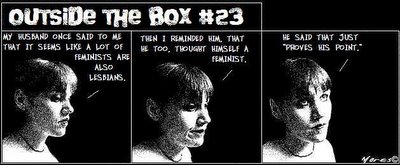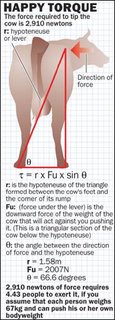"Manly" Feminism?

I am fascinated by the repetitions in the consensus or "stereotypical" view of feminism this journal assignment elicited. Though few said they believed the image was a true one, it is amazing how much power this image has come to hold. Does anyone really know anyone who fits this stereotype? Could this image be a reason women might hesitate to speak up about rights these days?
What images, attitudes and adjectives show up the most? You tell me.
- "When you say feminist, you have to accept that the first image popping into someone's head is a hairy-legged, man-hating vigilante."
- "the most politically visible feminists, are very aggressive and extremist in their actions. Many of them are very easily offended, very anti-men, and hostile."
- "the stereotypical feminist. The deranged bra burning lunatic."
- "stereotyped as these crazy man haters who bitch and moan and don't shave their legs."
- "today though, there are the extreme feminists that show so much aggression in getting what they want. They are offended easily and dislike men and their "evil" ways (lesbian? i think not)"
- "dike women who are all always advocating for women's rights and arguing about how they think everything is not fair. But we all know that this is not the true definition of a feminist"
- "Feminists today are viewed mostly as lesbian, a woman who is angry with the man's world, perhaps because she has been slighted by it. Feminism has unwittingly been subconciously affiliated with the gay and lesbian culture, which in and of itself is another major social controversy."
- "common caricature (sp?) of feminists as standoffish, bull-dyke type women yelling about how unfair life is"
- "strong feminists that hate men for being men"
- "radical, men haters that will fight to the death for women’s rights"
- "synonymous with complaining"
- "My idea of modern feminism may seem naively idealistic. Feminism brings to mind the civil rights movement of the sixties, in which minorities discovered their voices and fought for the rights they deserved. Women were doing the same in the sixties. Women came to realize that having a career wasn't such a bad thing, that they could be careerwomen and mother. This leads to the idea that a woman is capable of doing anything a man can. My mom has always emphasized the importance of fighting for my goals, no matter what anyone says. I would consider her a feminist in her own right. Yet, because of the negative stereotypes associated with feminism, women are hesitant to take on the label of 'feminist.'"
Could it be that women showing "manly" traits such as aggression, strength, assertiveness, and even "hairy legs" contribute to the aversion people feel toward feminism?
I'm just sayin'....




